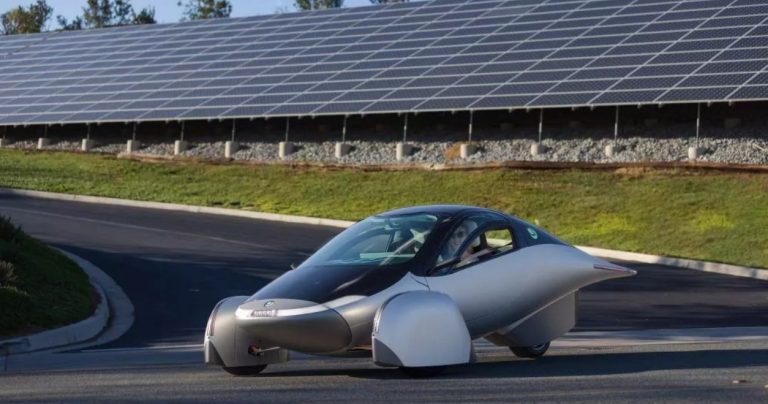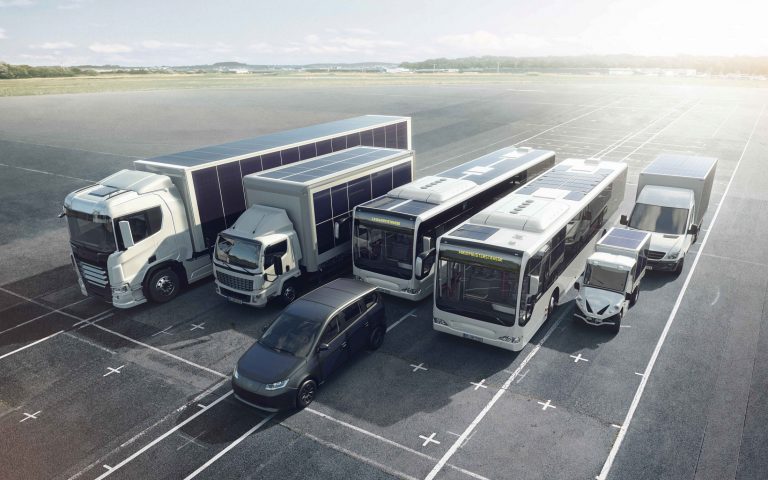Solar Start-ups

Aptera Model Gamma
(Mit freundlicher Genehmigung/Courtesy of Aptera Motors Corp. [Homepage])
Management Summary
Solar start-ups are equipping their vehicles with solar cells so that they can charge solar energy while driving or stationary. The idea sounds promising at first, because it reduces electricity costs and the vehicle does not have to go to the charging station as often.
However, the solar cells currently available are nowhere near efficient enough to be able to recharge energy for hundreds of kilometers. Depending on vehicle consumption and solar radiation, only 40 – 60 km per day are possible.
In addition, the idea only works if the vehicle is actually parked in the sun, i.e. not in a parking garage or garage.
But what really speaks against the approach is the fact that here the tail wags the dog.
To avoid any misunderstandings: the idea of installing solar cells on the body of electric cars is of course interesting. But that alone is not a big enough differentiator. After all, a car radio manufacturer doesn’t redevelop an entire vehicle just to show how well the radio works in a car.
Wouldn’t it be much more sensible to save development costs and install the solar cells in a marketable model?
Besides, it would be easy for Tesla and Co. to equip their models with solar modules themselves as soon as more efficient cells are available. The competitive advantage of the solar start-ups would be gone in one fell swoop.
It is therefore not surprising that 2 of the 3 solar start-ups listed here have already had to significantly change their company strategy or file for bankruptcy.
The Californian start-up Aptera pursues the most radical approach. Aptera is developing a 2-seater, extremely light and wind-slippery solar vehicle with very low energy consumption, which with its disguised wheels and idiosyncratic teardrop shape is clearly different from the common US vehicles. A very exciting product, though whether it will appeal to the tastes of American consumers remains to be seen
The German start-up Sono Motors had already redeveloped a complete solar car, but then there were not enough funds for production. Sono Motors now wants to market its own solar technology as a supplier, but it remains to be seen whether the transformation will succeed.
The Dutch company Lightyear Motors has also already had to adjust its strategy. The 1st model was completely overpriced at €250,000, and production was stopped for lack of demand. Now a cheaper vehicle is to be developed for €40000.

Aptera Modell Gamma
(Mit freundlicher Genehmigung/Courtesy of Aptera Motors Corp. [Homepage])

Configurator Aptera Homepage
(Mit freundlicher Genehmigung/Courtesy of Aptera Motors Corp. [Homepage])
Aptera was only founded in 2019 by Chris Anthony and Steve Fambro in San Diego, but both have previously developed electric vehicles. With the Gamma model, Aptera is taking a very radical approach. The vehicle has been quite consistently trimmed for low energy consumption, but can also transport only 2 people. It has 3 wheels, a very low weight and a very low air resistance.
The entry price is $25,900 for the 250-mile (402 km) range version. Optional ranges of 400, 600, or even 1000 miles (1609 km) can be configured, and for the 1000-mile version the base price is $44,900.00. The number of solar panels can also be configured, the surcharge for the maximum configuration is $900.
Up to 40 miles per day can be charged via the solar cells, which is roughly equivalent to the average daily driving distance in the USA. Especially for sun-drenched and densely populated Southern California, this idea of “driving only with solar energy” sounds fascinating, of course.
Overall, the Aptera is a very exciting product, but with its disguised wheels, idiosyncratic teardrop shape and small size, the vehicle is quite different from the usual cars in the USA. We are curious to see whether it will find the taste of the American consumer, but suspect that this vehicle will remain a niche product.

Model Sion from Sono Motors
(Mit freundlicher Genehmigung/Courtesy of SONO MOTORS GmbH [Homepage])

Vehicles equipped with solar technology from Sono Motors
(Mit freundlicher Genehmigung/Courtesy of SONO MOTORS GmbH [Homepage])
Sono Motors was founded in 2016 in Hesse by Laurin Hahn, Navina Pernsteiner and Jona Christians. A solar car called Sion was developed at great financial expense, but there was no longer enough money for production. A financial rescue campaign in 2022 did not bring the expected success, the original business model of a vehicle manufacturer was terminated.
Sono Motors is currently planning to transform into a supplier, i.e. the self-developed solar panels will be sold to other companies. According to Sono Motors, there are already 25 vehicle manufacturers in Europe and the U.S. that are testing Sono Motors’ solar panels in their products. Among the customers are manufacturers of cars, buses, refrigerated vehicles and RVs. In doing so, Sono Motors not only wants to act as an original equipment manufacturer, but also offer retrofit solutions for buses, for example.

Lightyear 02
(Mit freundlicher Genehmigung/Courtesy of Atlas Technologies B.V. [Press Area])
The Dutch BEV start-up Lightyear was founded in 2016 by former students of TU Eindhoven who had previously participated in many solar vehicle competitions. Based on this experience, Lightyear developed an electric vehicle called Lightyear 00, which was to be sold for €250,000. Due to lack of demand, production was stopped in January 2023 and the manufacturer had to file for bankruptcy.
With the support of private investors, a new company was founded to which the patents of the insolvent parent company were transferred. This new company is now planning to develop a lower-cost solar vehicle called Lightyear 02, with a sales price of €40,000.
